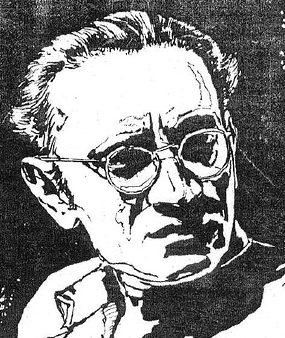As some people across the subcontinent get down to celebrating the 100th birth anniversary of the celebrated writer, born May 11, 1912 and described as way ahead of his time for his views on sex and sexuality, his native village and its residents are almost indifferent to the occasion.
Manto, known most for his edgy partition stories, was born in Paproudi, near Samrala town in Punjab’s industrial district of Ludhiana, and lived in Amritsar and Bombay before settling down in Lahore.
“The library gets about two to three visitors in a month,” said Lakhwinder Singh, a volunteer at the gurdwara where the one-room library is located. The library has about 200 books but only two to three books by Manto, that too the translated versions from the original Urdu.
“Not many people in the village, especially the youth, know of his association with the village,” Lakhwinder Singh pointed out.
Manto may be considered in the top echelons of the subcontinent’s literary world, thanks to his razor sharp stories on pre-independence India and the partition era, but his native Punjab and more so his village, Paproudi, seem to have let go of his memories.
Manto (1912-1955), popular for his short stories written between 1934 and 1955, may be celebrated elsewhere but Paproudi only seems to have a symbolic link with him today.
Among the old timers, his associate Ujjagar Singh, himself in the late 90s, gets reflective even though his own memory is beginning to fade.
“He used to stay mostly in Shimla with his father but used to come here for summer holidays. He rarely mixed with other children in the village and would keep to himself. But he was keen on football,” an almost incoherent Ujjagar Singh says.
The village, old timers recall, came to know about his literary skills only after he went to Bombay (now Mumbai) and became famous through his writings. Acquaintances like Ujjagar Singh, who is illiterate, never got to read Manto’s works due to their limitations.
Manto’s famous works include “Toba Tek Singh”, “Thanda Gosht”, “Khol Do” and “Boo”.
The writer, who studied in Amritsar before moving to Bombay, faced cases at least six times on charges of obscenity. Three of these cases were during British rule (before August 1947) and three later. But he was never convicted for these.
The house in Paproudi village, which belonged to Manto’s family, was auctioned by the government in the 1950s, as he settled in Lahore-Pakistan. It is now owned by one Ralla Singh.
Needless to say, the present owner and his farming family have little knowledge of Manto’s greatness.
IANS
The opinions, beliefs and viewpoints expressed by authors, news service providers on this page do not necessarily reflect the opinions, beliefs and viewpoints of Hill Post. Any views or opinions are not intended to malign any religion, ethnic group, club, organization, company, or individual.
Hill Post makes no representations as to the accuracy or completeness of any information on this site page.




